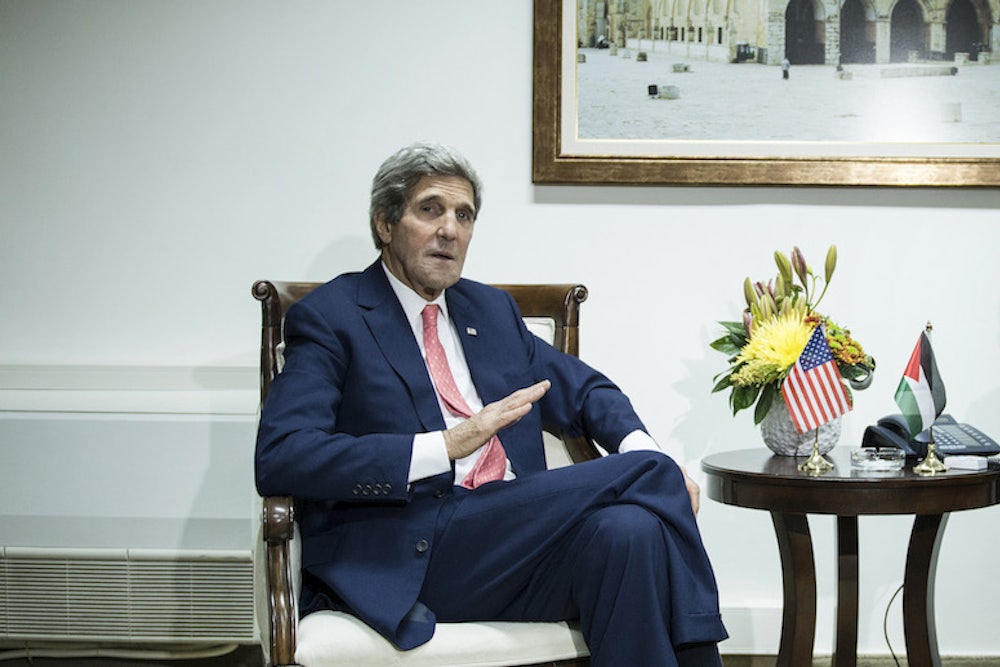The option adamantly rejected by Secretary of State John Kerry in his quest to achieve Israeli-Palestinian peace is the only route remaining to achieve substantial progress toward a gradual resolution of the conflict: a transition agreement that falls short of a comprehensive deal.
The refusal of the American team even to consider this approach ultimately led to the current deadlock in the negotiations for a Final Status deal. An “End-of-Conflict-End-of-Claims” agreement as envisioned by Kerry and his staff was bound to prove elusive once again.
The Palestinians, contrary to and despite their oft-stated public claims, were never enamored of the idea of making the inevitable compromises over core issues—refugees and Jerusalem—for what they see as no more than a tiny statelet. Mahmoud Abbas, like Yasser Arafat before him, has repeatedly stated his wish to see a Palestinian state within 1967 borders but he fails to prove, time and again, that this is his actual political platform. There is no craving amongst the majority of the Palestinians for sovereignty behind fences that will separate them from Israel. A leading Palestinian strategic thinker, Dr. Ahmed al-Khalidi, addressing a Georgetown University audience put it this way: “The concept of Palestinian statehood is nothing but a punitive construct devised by the worst enemies of the Palestinian people, the United States and Israel, in order to constrain Palestinian territorial aspirations and moral claims.”
Kerry and his aides made the wrong assumption that for the sake of a statelet, the president of the Palestinian Authority would be willing to make the necessary concessions. During nine months of talks, Abbas did not budge from his well-known positions, while, for the first time, Israel was prepared to accept the formula of 1967 borders with land swaps as a basis for an agreement.
Abbas exploited Prime Minister Netanyahu’s admittedly unwise approval of housing tenders in Jerusalem and the settlements during the sensitive negotiations in order to “shut down” the talks, according to a top American official. The Palestinian leader had already turned down the proposed American “framework for negotiations”; he had refused to meet Kerry on his latest trip to the region; and then moved to resuscitate the unimplemented reconciliation bargain with Hamas.
The Palestinians are pursuing what may be termed “runaway statehood,” to be reached through a unilateral Israeli withdrawal, such as the 2005 disengagement from the Gaza Strip, or by obtaining U.N. recognition of a Palestinian state without reaching an agreement with Israel. Alternatively, they are threatening to abandon the pursuit of statehood if this proves impossible: Abbas and his negotiators keep warning the Americans and the Israelis that they will dismantle the Palestinian Authority and thus collapse into Israel’s unwilling arms.
The road not taken by Kerry, a transition agreement, would have led the U.S. to seek a broad understanding between the parties that would temporarily bypass the insoluble core issues yet allow for the speedy establishment of a Palestinian state over 70 percent to 90 percent of the West Bank. Such a transition agreement would allow Israel and the Palestinians to dramatically change the political landscape while temporarily setting aside the most difficult issues that have prevented an agreement for the past 20 years that have elapsed since the signing of the Oslo Accords.
A transition agreement would entail security arrangements, some revision of the current customs union between Israel and the Palestinian Authority, and also dismantling Jewish settlements to the tune of 30,000-50,000 people. The Palestinians would not be asked to make any further concessions in order to get a Palestinian state going.
At present, Abbas objects to any interim agreement or a “Palestinian state with provisional boundaries” envisaged by the 2002 U.S.-backed Roadmap plan, but once the United States and the major donor states that foot the bill of the Palestinian Authority endorse a transition agreement the Palestinian leadership will have little choice. It is also likely that support can be mobilized for a transition agreement among many Arab and Muslim nations. The agreement will have to be internationally recognized with a supportive resolution by the Security Council.
There will have to be guarantees to the Palestinians that, following statehood, negotiations will continue to demarcate final borders and reach an agreed solution to the refugee problem and the status of East Jerusalem and the holy places. The conflict would thus be transformed into a dispute between two states. The Palestinians would get their state without giving up their national objectives, while Israel would obtain an end of the occupation.
